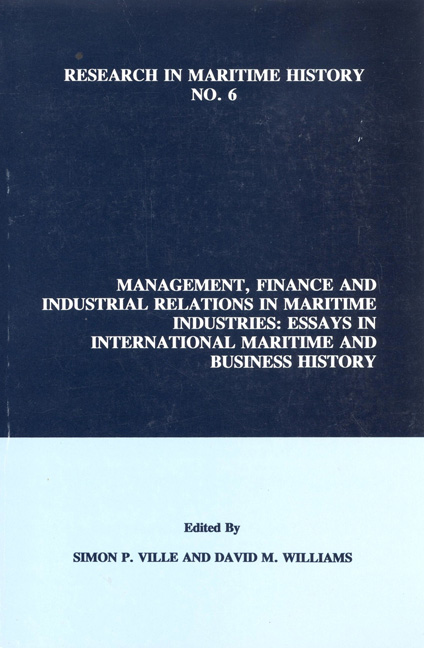 Management, Finance and Industrial Relations in Maritime Industries
Management, Finance and Industrial Relations in Maritime Industries Book contents
- Frontmatter
- Contents
- Contributors
- Introduction
- Contributors
- “Economic Theory, Information and Management in Shipbroking: Fearnley and Eger as a Case Study, 1869-1972”
- “The Early Nineteenth-Century Port of London: Management and Labour in Three Dock Companies, 1800-1825”
- “Owners and Masters: Management and Managerial Skills in the Finnish Ocean-Going Merchant Fleet, c. 1840-1880”
- “Management, Profitability and Finance in Twentieth-Century Spanish Merchant Shipping: The Compañía Maritima Del Nervion as a Case Study, 1899-1986”
- “Twentieth-Century Shipping Strategies: Broström and Transatlantic, Gothenburg's Leading Shipping Companies”
- “Contractors' Bounties or Due Consideration?: Evidence on the Commercial Nature of The Royal Mail Steam Packet Company's Mail Contracts, 1842-1905”
- “Patterns of Ownership and Finance in the Greek Deep-Sea Steamship Fleet, 1880-1914”
- “Financial Weakness and Industrial Conflict in Italian Shipbuilding Between the Two World Wars”
- “Responding to the Global Market in Boom and Recession: Japanese Shipping and Shipbuilding Industries, 1945- 1980
“The Early Nineteenth-Century Port of London: Management and Labour in Three Dock Companies, 1800-1825”
from Contributors
- Frontmatter
- Contents
- Contributors
- Introduction
- Contributors
- “Economic Theory, Information and Management in Shipbroking: Fearnley and Eger as a Case Study, 1869-1972”
- “The Early Nineteenth-Century Port of London: Management and Labour in Three Dock Companies, 1800-1825”
- “Owners and Masters: Management and Managerial Skills in the Finnish Ocean-Going Merchant Fleet, c. 1840-1880”
- “Management, Profitability and Finance in Twentieth-Century Spanish Merchant Shipping: The Compañía Maritima Del Nervion as a Case Study, 1899-1986”
- “Twentieth-Century Shipping Strategies: Broström and Transatlantic, Gothenburg's Leading Shipping Companies”
- “Contractors' Bounties or Due Consideration?: Evidence on the Commercial Nature of The Royal Mail Steam Packet Company's Mail Contracts, 1842-1905”
- “Patterns of Ownership and Finance in the Greek Deep-Sea Steamship Fleet, 1880-1914”
- “Financial Weakness and Industrial Conflict in Italian Shipbuilding Between the Two World Wars”
- “Responding to the Global Market in Boom and Recession: Japanese Shipping and Shipbuilding Industries, 1945- 1980
Summary
Introduction
One of the most challenging issues currently confronting labour historians is the impact of industrialisation on the experience of work. As economic historians increasingly emphasise the slow, uneven and diverse character of British industrial development in the eighteenth and early nineteenth centuries, so the notion of the transformation of the labour process as involving a substitution of time discipline, regular attendance and intensity of work for older modes is being called into question. In addition, even in developed manufacturing sectors, the role of the worker has been identified as closer to that of an active protagonist than a subservient and oppressed factor of production.
This re-evaluation has led not only to an interest in industrial relations focused less on trade union activity and more on broad labour/management contact but also to a new emphasis within business history, encouraged by a revitalisation of the sociology of work, on the significance of the labour process. It has also resulted in a closer scrutiny of the situation in individual cases. Yet what Berg has termed the “new microeconomics of the industrial revolution” is still firmly rooted in traditional expositions in that the area of concern is primarily manufacturing. The kind of questions asked about conditions in the textile industry, for example, have not been addressed to the management of labour employed in the movement of goods.
As far as port work is concerned, the lack of attention may follow from the perception that in the early nineteenth century this was a traditional business unaffected by mechanisation and dependent on manual labour - a view possibly encouraged unintentionally by studies, from the Webbs onward, of late nineteenth century dock workers which necessarily emphasise the seemingly primitive context of casual work in which many were employed. Ports, from this viewpoint, have little in common with those sections of the economy affected directly by industrialisation. Yet, while at first sight it might appear that their history can shed little light on the issue of proletariatisation, a moment's thought will call this into question.
- Type
- Chapter
- Information
- Management, Finance and Industrial Relations in Maritime IndustriesEssays in International Maritime and Business History, pp. 31 - 50Publisher: Liverpool University PressPrint publication year: 1994
